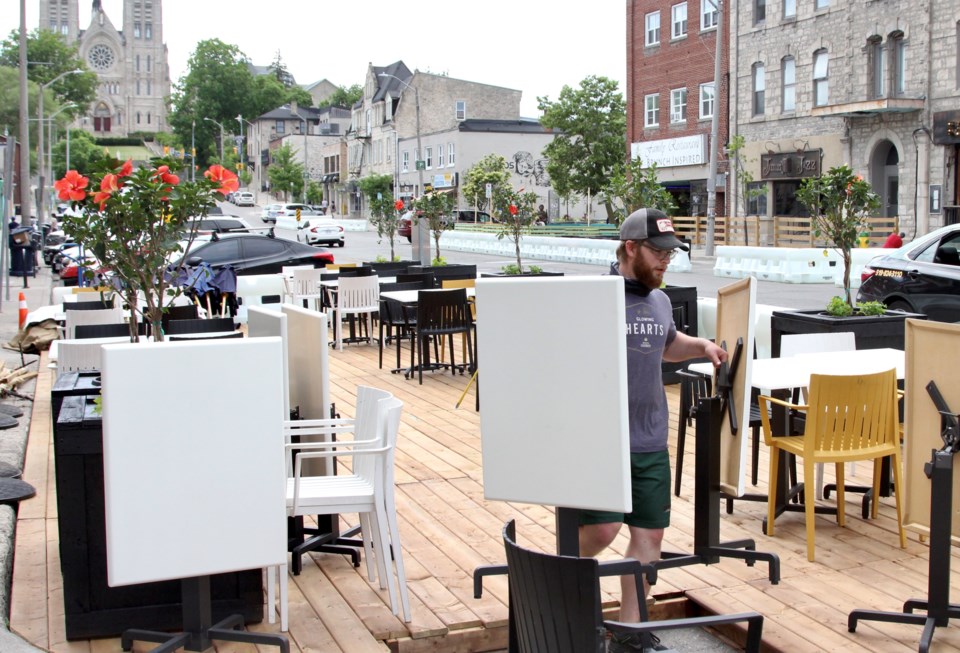I was leaving this week’s committee of the whole meeting and cutting through the Macdonell Street parking lot to get to my bus stop. There were three cars there playing musical parking spots; one car was pulling out, another car was waiting to take the spot and another was perhaps just waiting to turn around and leave.
“Here it is!” I though to myself. “Here’s Canada’s greenest, most environmentally-conscious city in another downtown parking junkpile.”
Downtown parking was on my mind because part of this week’s committee meeting was dedicated to the permanent version of the Seasonal Patio Program, which has parking concerns attached to it. The program, as it stands today and how it might stand in the future, is meant to embody a less car-dependent future, but like all things about our addiction to the automobile that’s easier said than done.
I want to try and separate the philosophy from the stakes for a moment. I know that there are a lot of businesses downtown that feel like they depend on parking, and I know that there are a lot of people in Guelph generally who feel like there’s not enough parking there to justify a visit, but let’s leave that aside for this minute.
First, what’s the point of creating a walkable district that everyone is still driving to? That was a question that stuck in my craw the first year of the patio program in 2020 when the intersection at Wyndham and Macdonell was closed, and I heard all the people who remarked about the lovely walkability once they drove downtown and left their car in one of the parkades or parking lots.
On a similar note, I saw this question come up during recent discussion around the update to the Downtown Parking Master Plan: How would you feel about parking in a lot outside the downtown and then being shuttled into the core?
This. Drove. Me. Crazy.
Why? Because the city already runs a shuttle bus service that brings people from all parts of Guelph into the downtown area every 30 minutes to an hour. It’s called Guelph Transit. What’s the point of still running every bus through downtown if city hall won’t promote it as a downtown shuttle bus if nothing else?
Now let’s look at this another way, and I mean the E-word: “European.”
The patio program is repeatedly sold on the idea of adding some apparently much-need European-ness to our downtown, while ignoring the fact that there’s a fundamental problem with this assertion; Guelph is not Europe and the reason there is a Guelph in the first place is because our ancestors crossed half the planet on an unforgiving ocean to get away from Europe.
Also, the parts of Europe we romanticize were literally set in stone centuries before anyone ever thought about an automobile (or horseless carriage, if you will), and our younger cities here were able to be transmogrified around the rise of the private car, especially in the post-war era.
You can’t paint black spots on a white horse and call it a cow, and you can’t shut down our four-to-six lane roads and call us “European.” Sorry if this bursts your bubble.
Of course, I was always suspicious about the benefits of the patio program. I winced as we fluffed ourselves about how “Guelphy” we are to turn parking spaces into patios, which seemed equal parts self-aggrandizing and over-compensation, but at least it appeared to be a shared vision. Three years later though, I can’t help but notice the cracks.
For one thing, there’s now a concern about the loss of public space. The big never-ending lunchbox social of the patio district is now an encroachment on the common areas, as if it never was in the first place.
The fee structure is changing, and that might mean that some patios are no longer profitable. For every owner like Richard Overland of NV Kitchen and Bar who says that patios are recipe for new success, there’s Frank N Stein’s co-owner Dario Di Renzo who says that the new fees are cost prohibitive, so they may no longer do a patio.
At issue is that the program must have a cost recovery model. Patios only help some businesses, and the city can’t invest in select businesses and not others, right?
And yes, some argue that the rising tide raises all boats, but those people have numerous counterparts that say their boat isn’t being raised at all. In other words, the city can’t subsidize a program that’s an advantage to some, a disadvantage to others, and may be outside the ability of others to participate in even if they want to.
Now city council’s been painted into a tricky position; they want to support the patio program, but they don’t want to use the city budget to pay for it, and they don’t want to be seen hanging operators upside down and catching all the pennies that fall out of their pockets either.
That’s why they were twisting themselves into knots with sometimes contradictory motions on Tuesday. A 1,600 per cent jump in fees seems like a bit much whether that’s year-over-year or over three years. It also seems a bit of a stretch to call this tourism and crack open the municipal accommodation tax, which is barely a year old. I’m not sure the data supports that yet.
All efforts to change the recommendation to find a middle ground between conflicting demands were stayed until the end of the month meeting, but it’s doubtful that any easy solutions will be presenting themselves in a week-and-a-half. Perhaps we just need to accept that we’re not yet ready for our patio utopia, at least until a few more of us willfully admit that a car is something we can live without.
